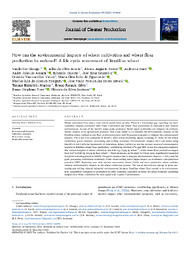Embrapa Wheat
 Busca de Publicações
Busca de Publicações
How can the environmental impacts of wheat cultivation and wheat flour production be reduced? A life cycle assessment of Brazilian wheat.
Author(s): GIONGO, V.; ACOSTA, A. da S.; DOSSA, A. A.; SANTI, A.; AMARAL, A. J. do; CAIERAO, E.; DENARDIN, J. E.; VIEIRA, O. V.; FIGUEIREDO, M. C. B. de; MATSUURA, M. I. da S. F.; SAVIOLI, J. P. das D.; MARTINS, T. B.; SILVA, B. R.; PIRES, B. S.; SANTANA, M. da S.
Summary: Wheat and wheat flour play a vital role in global food security. There is a knowledge gap regarding the environmental impacts associated with wheat cultivation and wheat flour production in subtropical and tropical environments. As one of the world's major grain producers, Brazil needs to identify and mitigate the environmental impacts of its agricultural products. This study aimed to (1) identify the environmental impacts of the Brazilian wheat cultivation and flour production system and (2) propose strategies to mitigate the environmental impacts. The study was conducted in Brazil's main wheat-producing region, assessing 61 farms in the wheat cultivation, grain transport, processing, and milling processes. Environmental impacts were calculated using SimaPro 9.5.0.2 with the Ecoinvent® v3.5 database. Wheat cultivation was the primary source of environmental impacts in Brazilian wheat flour production, contributing between 67% and 98% across the categories analysed. The carbon footprint of wheat cultivation was 0.50 kg CO2eq kg wheat?1, while wheat flour production ranged from 0.67 to 0.80 kg CO2eq kg flour wheat?1. Field emissions, particularly N?O from urea, significantly impacted the global warming potential (GWP). The grain transport had a marginal environmental impact (<1.5%), and the grain processing contributed minimally, while wheat milling had a higher impact on freshwater eutrophication potential (FEP). Replacing urea with calcium ammonium nitrate (CAN) and more productive wheat varieties reduced environmental impacts in the wheat cultivation process. The use of photovoltaic energy in grain processing and milling reduced industrial environmental impacts. Brazilian wheat flour proved to be environmentally competitive compared to production in other countries, especially in terms of carbon footprint, providing insights into wheat cultivation for subtropical and tropical environments.
Publication year: 2025
Types of publication: Journal article
Unit: Embrapa Wheat
Keywords: Farinha de Trigo, Impacto Ambiental, Produção, Sistema de Cultivo, Trigo

